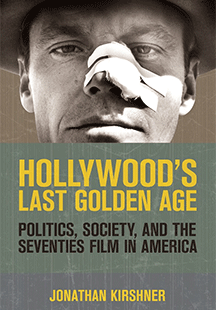By Benjamin Franklin Martin
The 1960s and early 1970s in America were tumultuous: the civil rights movement, political assassinations, sexual liberation, Vietnam, stagflation, capped by the “traumatic Shakespearean saga of the Nixon presidency.” Jonathan Kirshner argues that the most important films of this period clearly reflected these issues. Hollywood had long made movies presenting the inevitable victory of good over evil through trust in established institutions. But suddenly, every institution was under assault, suspicion replaced trust, and evil often routed good.
These “seventies films,” opening between 1967 and 1976, were dark, violent, populated by amoral characters who struggled against a society where ideals were hollow and dreams rarely came true. They were “morally ambiguous,” like the America they depicted, uncertain and anxious.
Bob Rafelson’s Five Easy Pieces (1970) and The King of Marvin Gardens (1972) and Michelangelo Antonioni’s The Passenger (1975) presented the new hero, alone and despairing, all his choices leading to dead ends. Arthur Penn’s Bonnie and Clyde (1967) and Sam Peckinpah’s The Wild Bunch (1969) and Straw Dogs (1971) emphasized the new climate of violence. Penn was blunt, “Let’s face it: Kennedy was shot. We’re in Vietnam shooting people and getting shot. So why not make films about it?” Peckinpah was no less so, “We’re all violent people, we have violence within us.”
Alan J. Pakula’s Klute (1971), Robert Altman’s McCabe & Mrs. Miller (1971), and Roman Polanski’s Chinatown (1974) questioned the definitions of law and justice by offering compromised men and women as more innocent than the authorities they confront. Hal Ashby’s Shampoo (1975), Altman’s Nashville (1975), and Pakula’s All the President’s Men (1976), were studies in political hypocrisy. Francis Ford Coppola’s The Conversation (1974), Pakula’s The Parallax View (1974), and Penn’s Night Moves (1975) portrayed paranoia as normal and necessary.
Kirshner’s “reading” of these films is fascinating, often profound, and always convincing.
The seventies film was the product of a specific moral climate, which changed with the end of the war in Vietnam, a severe recession, and the election of first Jimmy Carter and then Ronald Reagan. Relativism became less attractive, and the seventies film paled before the straightforward earnest morality of the “blockbuster,” first seen in Steven Spielberg’s Jaws (1975).
Benjamin Franklin Martin (ΦΒΚ, Davidson College, 1969) is the Price Professor of History at Louisiana State University and a resident member of the Beta of Louisiana chapter of Phi Beta Kappa.




